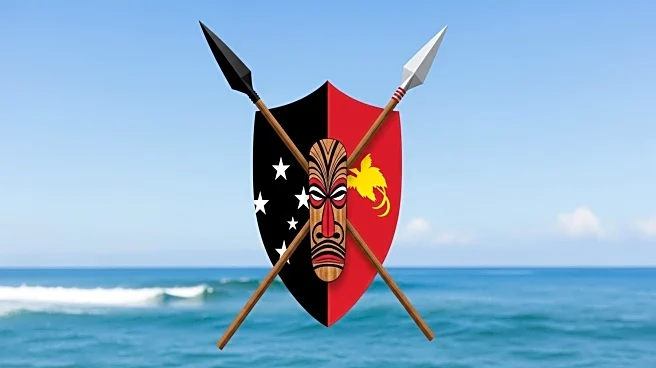What's Happening?
Australia and Papua New Guinea are set to sign a new defense pact aimed at integrating their defense forces to counter China's growing influence in the region. The agreement, announced by Australian Prime Minister Anthony Albanese, will be signed with Papua New Guinean Prime Minister James Marape. This pact will allow citizens of both nations to serve in either military, with Australia offering citizenship as an incentive for Papua New Guineans to enlist. The deal marks a significant upgrade in defense relations between the two countries, providing mutual defense support and integration of military assets. This move comes as several Pacific island nations have shifted allegiances from Taiwan to Beijing, raising concerns among U.S. allies about China's expanding security influence.
Why It's Important?
The defense pact between Australia and Papua New Guinea is a strategic move to strengthen regional security and counterbalance China's growing presence in the South Pacific. By integrating their defense forces, the two countries aim to enhance their military capabilities and ensure stability in the region. This agreement underscores Australia's commitment to being the preferred security partner in the Pacific, amidst increasing geopolitical competition. The pact could potentially influence other Pacific nations' security alignments, as they navigate the strategic rivalry between China and Western allies. The integration of defense forces also highlights the importance of regional cooperation in addressing security challenges.
What's Next?
Following the signing of the defense pact, Australia and Papua New Guinea will work on implementing the integration of their military forces. This may involve joint training exercises, sharing of military resources, and coordinated defense strategies. The agreement could prompt reactions from other Pacific nations, who may reassess their own security partnerships. Additionally, the pact may lead to further discussions on regional security cooperation, involving other countries like Fiji and Tonga. The evolving security dynamics in the South Pacific will likely continue to be a focal point for international relations in the region.
Beyond the Headlines
The defense pact raises questions about the balance of power in the South Pacific and the role of external powers in regional security. It also highlights the challenges faced by Pacific nations in maintaining sovereignty while engaging in strategic partnerships. The agreement may influence future diplomatic and economic interactions in the region, as countries navigate the complexities of international alliances.









